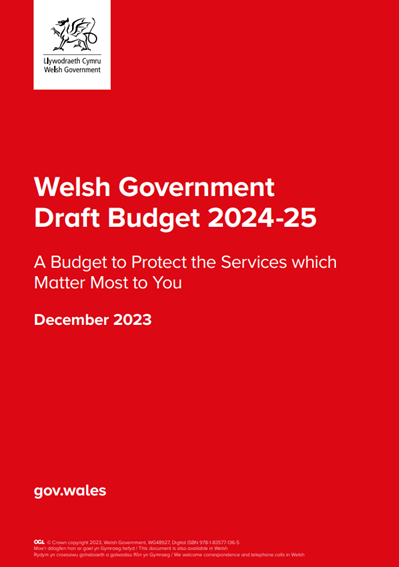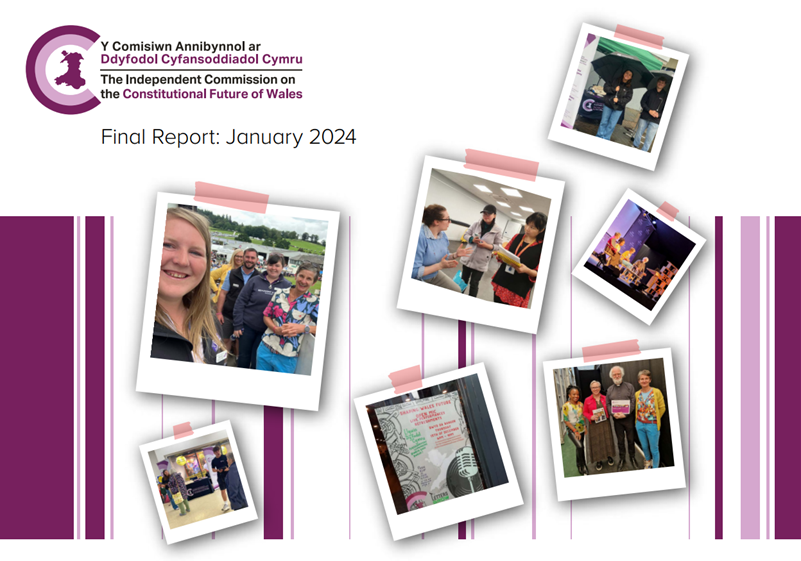FUNDING PUBLIC SERVICES UNDER PRESSURE

The Welsh Government published its Draft Budget for 2024/25 on December 19. While the funding available to Welsh Government from the UK Government and from devolved taxes has increased in cash terms, funding for many areas of public expenditure has been reduced even in those terms – and in nearly all areas once the high inflation of the past 12 months is taken into account.
As Guto Ifan of the Wales Governance Centre shows in his initial analysis, the reason for this is a choice by Welsh Government to increase spending substantially in two areas. The National Health Service receives an increase on previously published plans of £725 million (8%), thus matching inflation. Transport for Wales’s rail services receive an extra £111 million (a 43% increase on previous plans). These two increases absorb almost twice the extra amounts available to Welsh Government, resulting in a reduction in planned spending of £422 million across other areas.
Concern has been expressed by many organisations, including churches, at the effects of these reductions. For example, the Homelessness Prevention Grant is reduced by £3m compared to previous plans, and the Housing Support Grant is frozen in cash terms, meaning a real-terms reduction. This is contrary to calls by the homelessness sector – including churches and Christian organisations – for at least maintaining current levels of support. It also appears to be inconsistent with Welsh Government’s stated policy aim of ending homelessness, consultation on which ended on January 16.
Cymorth Cymru, the umbrella body for the housing sector in Wales, said, “As it stands, the draft budget is bad news for homelessness and housing support services across Wales and crucially, the people who need their help. We warned the Welsh Government that a failure to increase the Housing Support Grant could have devastating consequences.… In real terms, this critical, preventative grant is £24m less than it was in 2012. … If the Welsh Government wants to end homelessness, it must rethink this budget and give homelessness services the inflationary increase they need.”
Similar concerns are being expressed amongst organisations concerned with promoting equality for disadvantaged groups of people, whose funding from Welsh Government is to be reduced by over £1 million compared to the previous year. The Older People’s, Children’s and Future Generations Commissioners all face cuts of 5% in cash terms. Although not directly affected by reduced funding, churches and other faith groups often pick up the slack from reduced public services, and this is likely again during 2024-25. Churches housed in historic buildings will also be very concerned at a reduction of over 20% in funding for Cadw.
Cytûn has been involved in working with the Welsh Treasury on improving the Strategic Impact Assessment published as part of the budget documents. The Impact Assessment (pp 26-45) published on this occasion acknowledges some of the negative effects. For example, despite the legal requirement in the Well-being of Future Generations Act to focus on prevention, preventative health spending is being reduced. Welsh Government says this “could impact the capacity of prevention services such as smoking cessation, weight management and exercise support.” (p. 34) The document acknowledges that groups protected by the Equality Act will be particularly affected by a number of the changes.
The extensive budget documents are available here. The Senedd’s subject committees are scrutinising the detail of each budget and publishing the submissions made by each department, and these will be published as an omnibus document in due course.
THE CONSTITUTIONAL FUTURE OF WALES?

On January 17, the Independent Commission on the Constitutional Future of Wales, co-chaired by the Rt Revd Dr Rowan Williams and Prof. Laura McAllister, published its final report on options for Wales’ future, following a two-year national conversation with the people of Wales.
Much of the coverage of the report – including the Commission’s own press release – revolved around its assessment of three constitutional options for Wales:
- Enhanced devolution within the current settlement, with devolution of policing, justice and rail infrastructure, and changes to the way Wales is funded. [The report was completed before the greatly increased costings of the current devolution of some rail services was known – see p. 1 of this Bulletin].
- A federal UK, subject to an appetite for change in the rest of the United Kingdom.
- An independent Wales, which would offer significant opportunities to shape the country’s future, but also substantial risks economically in the short to medium term.
Cytûn submitted evidence, as did the Catholic Church and the Presbyterian Church of Wales, mainly about the current devolution settlement and issues arising from the relationships between local, Welsh and UK government. We also submitted a document from the Society of Friends about truth and integrity in public life. Some of these issues are picked up in chapters 3-6 of the report, which include a detailed analysis of the way government works at the moment, and reflect the churches’ concerns that – whatever the constitutional framework – the governance of Wales should be coherent, effective and work in the interests of all its citizens, especially those who are most vulnerable or dependent on public services.
Dr Williams referred to some of the more innovative means that the Commission had used to gather evidence, saying: “This is Wales’ national conversation and … our report is the result of 2 years of open discussion. We’ve focused on hearing from different voices across Welsh communities, as well as the advice of experts. This has been an exercise in communicating directly with the people of Wales, collecting evidence and seeking to understand their lived experiences. This dialogue has been hugely valuable, but there is much more work to be done. We need to make sure that everyone has a voice in deciding the future path of their nation – the national conversation we have begun has to continue beyond the life of this commission. We have demonstrated that this approach can build intelligent, robust discussions and an educated, high-participation democracy. … As a commission, we call on those in power to ensure that the national conversation doesn’t end here and to take urgent action to protect Welsh democracy.”
One issue of constitutional importance currently under discussion in the Senedd is possible changes to the electoral system. The Commission’s report, and the report of the Senedd’s Reform Bill Committee report, have both raised concerns about the suggestion that from 2026 voters in Senedd elections should only be able to choose between parties, without being able to vote for (or against) individual candidates. Although Cytûn member churches have not voiced an opinion on this matter specifically, ensuring truth and integrity in public life requires that individuals – and not just political parties – are accountable for their decisions, their moral stances and their behaviour in their work.
UK GENERAL ELECTION 2024
A UK General Election must, by law, be held on or before 28 January 2025. As a date in January 2025 would involve a campaign over Christmas and New Year – thought likely to be highly unpopular with voters – it is safe to assume that an election will be held during 2024.
As usual, churches across the UK will be encouraging local congregations to consider holding meetings with candidates (whether as traditional hustings or in another format), and will be encouraging all those who are eligible to register to vote, and political parties and candidates to engage in constructive and respectful debate. A Churches Elections website will be available soon with resources for all these purposes.
A number of member churches and Christian organisations will be participating in projects to focus on issues which are of particular concern to Christians. Amongst these are:

- Let’s End Poverty, a broad coalition which aims to focus on the social and wellbeing challenges low-income households experience – from social isolation to limited opportunities, and disadvantages in healthcare and education. Ameliorating this would include improving the social security system, access to good quality and reliable work and good housing, and addressing inequalities in healthcare and education. Three member churches of Cytûn (the Baptist Union of Great Britain, the Methodist Church and the United Reformed Church) were founder members, and the Church in Wales, the Catholic Caritas network and several other Christian organisations have expressed support.
- The Act on Poverty Lent course, promoted by Christian Aid, Trussell Trust, Church Action on Poverty and the three founder churches of Let’s End Poverty, will extend the focus from poverty in the UK to poverty worldwide, examining issues such as the UK’s international development aid and record on climate change. Bilingual material will be available.
- Nature 2030, of which Cytûn member ARocha UK (who run EcoChurch) is a founder member, is a broad coalition of those seeking to begin to restore the UK’s depleted biodiversity by 2030, and tackle air pollution and plastic pollution. Covering a mix of issues devolved to Welsh Government and reserved to Westminster, the campaign intends to produce resources for the election.
- The Churches’ Refugee Network, hosted by Churches Together in Britain & Ireland, will be producing resources on migration and asylum issues.
Cytûn is keen to hear from member churches and organisations of their plans for the election – please send details to gethin@cytun.cymru.
Grants and Resources from Fair Trade Wales

Fair Trade Wales is offering grants of up to £500 to encourage communities to celebrate Fair Trade. This year, we are celebrating 15 years since Wales became the world’s first Fair Trade Nation, with the support of many churches and organisations within Cytûn. Communities (which include churches, businesses, groups of individuals, schools etc) can use the grant in a flexible way that celebrates and promotes Fair Trade.
Fair Trade Wales also has many resources in its office in Cardiff and these can be sent or lent to local churches and organisations. The resources page is currently being renewed, but among the resources are posters, stickers, banners, games etc. If you would like to order anything either email Kadun Rees – kadun@fairtradewales.org.uk – or contact via the website https://fairtrade.wales/
Connecting parents in Wales
For the past 12 months, Children in Wales have convened a programme designed to enable parents better to participate in policy making by public bodies in Wales. It has grown out of an awareness that busy parents find it difficult to access the standard means of consultation – formal consultations requiring written responses; online meetings during the school day; short timescales and so on.
Cytûn has been involved in the Professionals’ Forum of the project from the start, in order to ensure that parents of faith have their voices heard. The Children in Wales team have worked with local faith groups as well as many others to canvas views and seek engagement.
The next stage of the project – once the 12 month Welsh Government grant ends – will be launched at a webinar on February 27. As part of this, parents are invited to share videos, photos and blog posts – see details in the poster to the left.
Help with the cost of living

Despite the cuts in its budget (pg. 1) the Welsh Government continues to fund a support service for those seeking help with rising living costs. To find out what help is available you can go to the website https://www.gov.wales/here-help-cost-living or call the free Advicelink Cymru helpline on 0808 250 5700.
It can help with questions such as:
• Am I eligible for Universal Credit?
• Help with health costs
• Carer’s allowance for a carer, and help with personal care for yourself
• Eligibility for Pension Credit for those over state pension age
• Help if you are pregnant or with a child under 4 years of age.
• Free school meals
Housing Justice announces appointment of Bonnie Williams as new CEO

Cytûn member Housing Justice has announced the appointment of Bonnie Williams as new CEO from April 2024. Bonnie, who has been Housing Justice Director for Wales since March 2020 will be taking the reigns from Kathy Mohan OBE who retires at the end of the financial year. During her tenure as Director for Wales, Bonnie has grown Housing Justice Cymru, and introduced a range of groundbreaking new measures to tackle homelessness across Wales. These include the highly-acclaimed Citadel programme which utilises trained volunteers to support individuals at risk of or experiencing homelessness; Seeking Sanctuary – a refugee hosting programme; and continuing to develop Faith in Affordable Housing – a project which helps churches to use derelict or vacant land for affordable housing. Bonnie has recently developed a new programme to support Ukrainians leaving their hosting placements to find new homes in the private rented sector.
DEATH, FUNERALS AND BEREAVEMENT
Churches are central to holding funerals and assisting the bereaved throughout Wales. There are three recent developments that will be of interest to those involved in this ministry.
Statutory scrutiny of deaths by medical examiners
The UK Government has published details of reforms to the certification of deaths which it will introduce from April 2024 onwards. At the same time, the Welsh Government published a draft version of the Medical Examiners (Wales) Regulations. In addition, Eluned Morgan MS, the Minister for Health and Social Services issued a Written Statement.
These changes will put all the obligations, duties and responsibilities of the medical examination system on a statutory basis and provide an early opportunity to raise any concerns about a particular death. They mean that from April 2024 all deaths in England and Wales, without exception, will be independently reviewed by either a medical examiner or a coroner. This change may in some cases have implications for the timing of funerals following an unexpected death.
The NHS Business Services Authority and the Department of Health and Social Care are developing a digitised Medical Certificate of Cause of Death (MCCD) for England and Wales, which will be introduced in due course.
Law Commission’s Burial, Cremation and New Funerary Methods project.
Cytûn and a number of our member churches met with the Law Commission during 2023 to discuss this project. Terms of Reference have now been announced, with three strands:
- Burial and Cremation, which will look at the law governing different types of burial grounds and crematoria, including grave reuse. This is now in pre-consultation phase, and will run until the end of 2025.
- New Funerary Methods, which will consider a future-proof regulatory framework for new methods of dealing with a body after death, such as human composting and alkaline hydrolysis, which will run until spring 2026.
- Rights and Obligations relating to Funerary Methods, Funerals and Remains, which will look at issues including whether a person’s wishes about their body after death should be legally binding, who should have the right to make decisions about bodies, and public health funerals. This strand will run from the end of 2025 to the end of 2027.
Compassionate Cymru
Cytûn has for many years been involved in Compassionate Cymru, started originally by the late Professor Hywel Francis MP as Byw Nawr (Dying Matters in Wales), leading to the Compassionate Cymru Charter for Wales, 2020. This was supported by a significant investment by Macmillan who funded a central programme role and two co-ordinators in south-east Wales, and the Welsh Government who funded two further co-ordinators in North Wales.
Progress was hampered by the pandemic and nurturing Wales as a Compassionate Country is not a short-term exercise. We have learnt that a community of care, or movement, led by ordinary people which evolves organically and where people take ownership is more sustainable. Such a movement is then driven and owned by the communities which it serves but needs some resource to facilitate the flow of information between the parties including an on-line presence.
Agreement has now been reached for Age Cymru to administer a secretariat function to the Compassionate Cymru network, funded by the Welsh Government as part of the existing Healthy Ageing Programme. This will provide the necessary engagement with “grass roots” communities, as well as a range of on-line resources to encourage and facilitate collaboration, exchange of information, and events management. The Minister for Health and Social Services has endorsed this approach and has asked that the Programme Board for Palliative and End of Life Care retains oversight of this initiative, and reports progress to her as part of normal reporting procedures.
Cytûn will continue to be involved on behalf of our members in this new stage of development.
Churches urged to nurture hope in face of COP28 disappointment
Though the UAE Consensus agreed at the COP28 climate summit in Dubai in December failed to produce a detailed plan to “transition away” from fossil fuels, there is still hope that the world can move toward climate justice, said World Council of Churches general secretary Rev. Prof. Dr Jerry Pillay. “Though the operationalisation of the Loss and Damage Fund was secured early on at the start of the global climate conference, the financial pledges currently on the table can only be described as measly, falling far short of what is needed to respond to the devastating impacts of climate change in poor, climate-vulnerable nations,” said Pillay. “… And yet, somehow, despite the grim science and frustrating political realities, there is also much from which to draw hope. COP28 saw developing countries like Colombia leading the way in endorsing the Fossil Fuel Non-Proliferation Treaty.”
Bishop John Arnold, Lead Bishop for Environmental Issues in the Catholic Bishops’ Conference of England and Wales expressed “guarded optimism” regarding the outcome of the conference. However, he also sounded a note of caution: “I see far too many references to targets needing to be agreed – things needing to be settled. The language is right, but there’s no real sign of measured commitments being met and sanctions for anyone who doesn’t meet the commitments. Is this greenwashing? I hope it’s not.”
More information can be found on the World Council of Church’s special webpage, and in the assessments of Christian Aid and Catholic overseas aid and development agency CAFOD.
World Watch List 2024
During January, nearly 100 MPs attended the launch of Open Doors’ 2024 World Watch list of countries where Christians face severe persecution. Afterwards, there was a prayer gathering at Westminster Chapel, including an address by CEO Henrietta Blyth and interviews with representatives of the persecuted church in Nigeria and Iran. It is available on YouTube – https://www.youtube.com/watch?v=vCVENbEcQ7U
The 2024 World Watch List is now available on the website (www.opendoorsuk.org) and printed copies can be ordered online. The Welsh language version will be available in a few weeks’ time.
Cytûn at summer events 2024
As usual Cytûn will coordinate the presence of Welsh churches and Christian organizations in the summer events. Anyone who wants to help this year is welcome to open meetings as follows:
- For the Urdd (Youth) National Eisteddfod in Meifod, Montgomeryshire (May 27 – June 1) at 7.00pm on Wednesday March 6th in Capel Moreia, Llanfair Caereinion
- For the Royal Welsh Show, Llanelwedd (July 22-25) at 2.30pm on Wednesday March 6th at the Christian Centre for Rural Wales (CCRW) on the Showground,
- For the National Eisteddfod of Wales in Pontypridd (August 3-10) at 7.00pm on Thursday, March 21st at St Catherine’s Church in Pontypridd town centre.
More details are available from the co-ordinator Aled Davies – aled@ysgolsul.com
CONTACTING CYTÛN’S POLICY OFFICER
Parch./Revd Gethin Rhys – Swyddog Polisi/Policy Officer
Cytûn – Eglwysi ynghyd yng Nghymru/Churches together in Wales
Registered office: Room 3.3, Hastings House, Fitzalan Court, Cardiff CF24 0BL
Mobile: 07889 858062
E-mail: gethin@cytun.cymru
www.cytun.co.uk @CytunNew www.facebook.com/CytunNew
Hapus i gyfathrebu yn Gymraeg ac yn Saesneg.
Happy to communicate in Welsh and English
Cytûn is a registered company in England and Wales | Number: 05853982 | Registered name: “Cytûn: Eglwysi Ynghyd yng Nghymru/Churches Together in Wales Limited” |
Cytûn is a registered charity | Number: 1117071
Publication date: January 29 2024. The next Bulletin will be published on March 26 2024.
